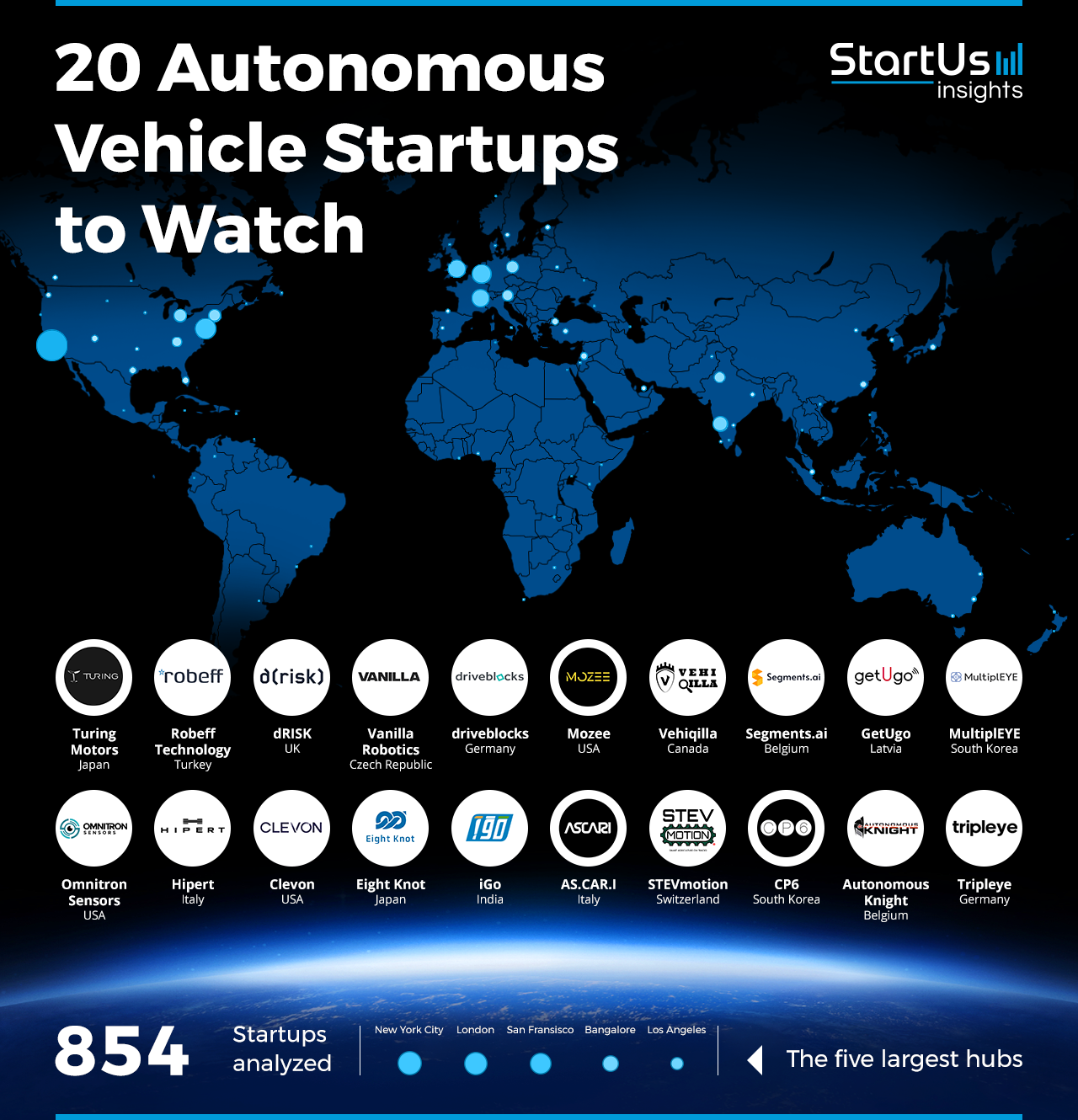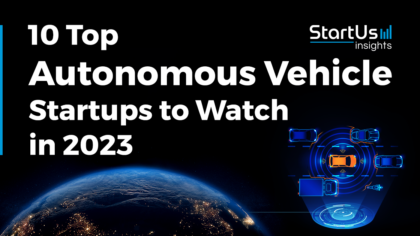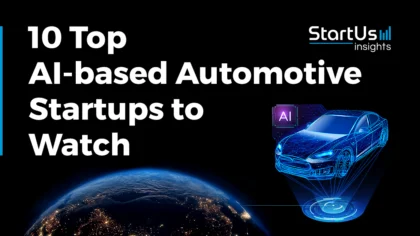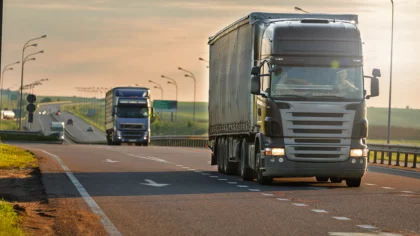Autonomous vehicles experience advancement in 2025, with driverless electric vehicles and autonomous delivery robots leading the way. Full-stack perception modules and robot fleet management enhance safety and efficiency, while vehicle autonomy software transforms car interactions. The rise of autonomous vehicle fleets and infrastructure necessitates robust security measures. Vehicle data labeling and teleoperation assist in training and managing these vehicles, and omnidirectional environment sensing boosts their capabilities. Explore 20 innovative autonomous vehicle startups driving these innovations in 2025 and beyond.
This article was last updated in July 2024.
20 Autonomous Vehicle Startups to Watch (2025)
- Omnitron Sensors – Micro-Electromechanical Systems (MEMS) Sensing Technology
- Hipert – Modular Long-range Underwater Autonomous Vehicles
- Clevon – On-demand Autonomous Delivery Vehicles
- Eight Knot – Autonomous Boats Network
- iGo – Autonomous Micromobility
- AS.CAR.I – Autonomous Car Intelligence
- STEVmotion – Autonomous Vineyard Vehicle
- CP6 – Autonomous Mobility Accident Analysis
- Autonomous Knight – Autonomous Long Range Electro-Optical Unit
- Tripleye – 3D Environment Perception
- Turing Motors – Driverless Electric Vehicles
- Robeff Technology – Autonomous Delivery Robots
- dRISK – Autonomous Vehicle Training
- Vanilla Robotics – Robot Fleet Management
- driveblocks – Vehicle Autonomy Software Modules
- Mozee – Autonomous Vehicle Fleets & Infrastructure
- Vehiqilla – Autonomous Vehicle Security
- Segments.ai – Vehicle Data Labeling
- GetUgo – Vehicle Teleoperation
- MultiplEYE – Omnidirectional Environment Sensing
Global Startup Heat Map highlights 20 Autonomous Vehicle Startups to Watch
Through the Big Data & Artificial Intelligence (AI)-powered StartUs Insights Discovery Platform, covering over 4.7M+ startups & scaleups globally, we identified 854 Autonomous Vehicle startups. The Global Startup Heat Map below highlights the 10 autonomous vehicle startups you should watch in 2025 as well as the geo-distribution of all autonomous vehicle startups & scaleups we analyzed for this research.

Want to explore all 850+ autonomous vehicle startups & scaleups?
Based on the heat map, we see high startup activity in the USA and Europe, followed by India. These autonomous vehicle startups work on solutions ranging from robot fleet management and vehicle teleoperation to driverless electric vehicles and autonomous vehicle security.
As the world’s largest resource for data on emerging companies, the SaaS platform enables you to identify relevant technologies and industry trends quickly & exhaustively. Based on the data from the platform, the Top 5 Autonomous Vehicle Startup Hubs are in New York City, London, San Francisco, Bangalore & Los Angeles. The 20 hand-picked startups highlighted in this report are chosen from all over the world and develop solutions for driverless electric vehicles, omnidirectional environment sensing, vehicle autonomy software modules, and autonomous vehicle security.
Explore 20 Autonomous Vehicle Startups to Watch (2025)
Omnitron Sensors uses MEMS Sensing Technology

USA-based startup Omnitron Sensors builds MEMS sensing technology to enhance efficiency and performance. The startup’s core IP leverages a new topology for MEMS, simplifying assembly and improving device performance. Utilizing silicon on insulator (SOI) and surface machining, it creates a hybrid design with three-dimensional polysilicon for MEMS sensors and actuators, similar to microelectromechanical origami.
This design achieves higher capacitance per unit area and allows more flexible system alignment for optical applications. Moreover, it reduces costs and enhances production efficiency for price-sensitive, high-volume markets. The technology benefits industries relying on MEMS devices, such as automotive, consumer electronics, security systems, and environmental sensors.
Hipert builds Modular Long-range Underwater Autonomous Vehicles

Italian startup Hipert develops advanced autonomous driving systems, focusing on AI, algorithms, and software solutions. Its products include aerial drones, autonomous underwater and surface vehicles, street cars, and cameras, among others. The startup’s aerial drones are embedded with intelligence and have industrial, societal, environmental, and agricultural applications. Its underwater autonomous vehicles include a remotely controlled catamaran, an AUV manipulator, and a modular long-range underwater autonomous vehicle (LRUAV). Moreover, Hipert develops forklifts for autonomous warehouse operations and autonomous rovers for delivery transportation.
Clevon develops On-demand Autonomous Delivery Vehicles

Clevon, a USA-based startup, manufactures autonomous electric robot carriers for last-mile delivery. These vehicles easily navigate through the urban environment, delivering various goods, ranging from groceries to home appliances. A single teleoperator oversees multiple carriers, leading to a substantial reduction in operational costs. By revolutionizing delivery methods with zero emissions, the startup also assists companies in meeting their carbon emission targets.
Eight Knot manages Autonomous Boats Network

Japanese startup Eight Knot develops AI Captain, an autonomous navigation platform for small vessels. This AI-powered marine control system determines the efficient route and ensures safe navigation to the destination. It is equipped with sensors to identify potential obstructions, including other vessels and floating debris.
Further, the startup provides an autonomous docking feature that leverages multiple sensors to detect and estimate the distance from the pier. The system automatically departs and docks, taking into account environmental factors such as tidal currents and wave patterns. Through the integration of AI and robotics, Eight Knot advances aquatic mobility.
iGo advances Autonomous Micromobility

Indian startup iGo develops BeiGo, an electric bike that incorporates an advanced driving assistance system (ADAS). This system includes features such as self-stabilization at low speeds and intelligent auto-swiveling at high speeds. The vehicles are designed with a focus on safety and smart mobility, while also maintaining a high capacity and minimal environmental impact.
The ADAS utilizes predictive data analytics to promote safer user behavior and adherence to road etiquette. The E2W technology includes a motorbike with auto-summoning, auto-parking, and auto-docking capabilities, along with features such as SOS, remote speed limitation, and 5G compatibility. The startup also reduces traffic congestion and accidents by decreasing the necessity for personal vehicle ownership.
AS.CAR.I offers Autonomous Car Intelligence

Italian startup AS.CAR.I develops autonomous driving algorithms for high-performance vehicles. It controls vehicles at the handling limit and performs prediction and perception tasks. The startup’s technology integrates advanced telemetry, accurate positioning, and improved active safety. Advanced telemetry facilitates on-vehicle data collection and visualization, providing the driver with a detailed understanding of racing performance.
Accurate positioning amalgamates data from various on-board sensors to achieve centimeter-level vehicle positioning. Real-time monitoring of track conditions optimizes high-performance driving. AS.CAR.I’s technology provides enhanced driver assistance in critical and emergency scenarios, thereby improving safety on both tracks and open roads.
STEVmotion manufactures Autonomous Vineyard Vehicle

Swiss startup STEVmotion develops Vineatrac, an autonomous robot for viticulture. This robot autonomously performs various tasks such as spraying, mowing, and mechanical weeding. It enhances the efficiency of vineyard work while prioritizing safety. Vineatrac’s design is lightweight and compact, with a low center of gravity, and is suitable for navigating difficult terrains. It is equipped with a long-range remote control for manual operation when necessary. STEVmotion emphasizes sustainability in viticulture by automating labor-intensive mechanical tasks, thus fostering environmentally friendly practices.
CP6 enables Autonomous Mobility Accident Analysis

South Korean startup CP6 develops ACAT, an application designed to swiftly and efficiently validate the functionality of autonomous driving features. These features include the automated driving system (ADS), ADAS, and lane keeping assist systems (LKAS). The startup’s focus extends to a variety of autonomous environments, encompassing automobiles, unmanned ships, and intelligent construction machinery. Its technology provides solutions for insurance firms, investigative agencies, and everyday users. CP6 provides rapid and precise analysis of data from autonomous vehicles, thereby streamlining crash reporting and safety verification processes.
Autonomous Knight develops Autonomous Long Range Electro-Optical Unit

Belgian startup Autonomous Knight constructs LEO-1, a multispectral camera system that outperforms conventional LiDAR in terms of spatial resolution and overall performance. The image data generated is utilized to create 3D digital models of the world for applications in geospatial mapping. The multispectral dataset contains more valuable information compared to a standard camera image or a LiDAR point cloud.
The startup’s sensor allows vehicles to achieve identification performance exceeding 200 meters under any weather conditions, both day and night. This capability also enables the monetization of imagery for high-value applications such as predictive haul road maintenance. Autonomous Knight’s technology enhances situational awareness for vehicles, UAVs, and vessels, thereby promoting safer and more efficient autonomous operations.
Tripleye simplifies 3D Environment Perception

German startup Tripleye provides essential modules that streamline the construction of autonomous vehicles. Its solutions encompass 3D perception, simultaneous localization and mapping (SLAM), planning, classification, and control. 3D perception involves real-time comprehension of the 3D environment. SLAM creates and updates environmental maps, as well as the estimation of vehicle pose.
Path and motion planning sequences a vehicle’s motion through unobstructed spaces from the starting point to the destination. Object recognition and tracking classify objects and their real-time location within the 3D environment. Lastly, motion control involves the derivation of control parameters to execute the motion. Tripleye’s solutions thus have applications in a variety of industries, including mining, defense, and automotive.
Interested in exploring all 850+ autonomous vehicle startups & scaleups?
Turing Motors enables Driverless Electric Vehicles (EV)

Japanese startup Turing Motors manufactures self-driving EVs and autonomous solutions. It deploys large-scale language models (LLMs)-based AI for advanced judgments. It operates autonomously using sensors and high-precision 3D data of the surrounding area. The startup provides automated driving kits for existing vehicles and automated driving software. This helps the automobile and transport industry to switch to a smarter experience at a reduced cost. Turing Motors offers AI-based autonomous driving solutions for improving the driving experience and road safety.
Robeff Technology makes Autonomous Delivery Robots

Turkish startup Robeff Technology develops autonomous robotic vehicles for food and retail deliveries. It uses an embedded advanced driver-assistance system (ADAS) and driverless vehicle system to perform indoor and outdoor last-mile deliveries efficiently and securely. The startup’s product line includes RBF-ESC200, an electronic speed controller, and RBF-DBW40, a single-phase bidirectional steer-by-wire and brake-by-wire control unit. Robeff Technology’s torque sensor interface offers better efficiency and faster response times for safe autonomous control. This reduces the cost of in-house delivery operations for various industries, including food and retail.
dRISK aids Autonomous Vehicle Training

UK-based startup dRISK offers its AI Canvas, a tool for human-AI interaction designed to enhance predictions, uncover unknowns, and maximize the value of data. Moreover, the startup’s Knowledge Graph is a scenario database and risk assessment solution. It assists AV developers, fleet operators, and infrastructure planners by accessing a vast database of edge case scenarios, comprehensive annotations, metrics, and AI-assisted data processing. This platform ensures test coverage over the risk landscape and analyzes scenarios using industry-standard and additional metrics, providing a deeper understanding of safety performance.
Vanilla Robotics simplifies Robot Fleet Management

Czech Republic-based startup Vanilla Robotics develops an autonomous robotics platform. It offers an iPad app for robot control and a web application for robot fleet management. It leverages its occupancy map to help robots detect and avoid obstacles in the path and allow industries to deliver payloads or parcels. The startup’s vision-based point cloud autonomous navigation, in mapped areas, reduces the need for sensors and improves navigational accuracy inside industrial spaces. Vanilla Robotics also offers autonomous robot navigation on city pavements and closed areas through open source as well as customized development.
driveblocks develops Vehicle Autonomy Software Modules

German startup driveblocks develops and integrates modules into the software stack and hardware components of vehicles to achieve safety and performance targets. It utilizes decision-making algorithms to analyze and predict the movement of vehicles to provide safe and continuous operation in mixed-traffic environments. The startup also offers a ready-to-deploy module for generating models which enables object and drivable space detection for motion planning and control. driveblocks’ software modules facilitate autonomous driving and automation solutions in the commercial vehicle sector.
Mozee advances Autonomous Vehicle Fleets & Infrastructure

US-based startup Mozee streamlines autonomous vehicle fleet and infrastructure to simplify mass mobility and public transport. It uses stereo cameras, LiDAR sensors, and spatial data with sensor placement to provide a 360-degree view. This allows vehicles to detect and perceive objects in all directions and also provides an overlapping field of coverage. Mozee’s solution enables self-driving in electric cars while ensuring temperature control and increased visibility to adapt to changing traffic patterns.
Vehiqilla improves Autonomous Vehicle Security

Canadian startup Vehiqilla aids fleet incident management and cyber governance for autonomous vehicle fleets. It offers in-vehicle secure architecture (IVSA) to OEMs and suppliers to ensure secure and effective vehicle functionality. The startup enables connected and autonomous vehicles (CAVs) to communicate with multiple objects through vehicle-to-everything (V2X) technologies. This include real-time vehicle-to-infrastructure (V2I), vehicle-to-vehicle (V2V), and vehicle-to-pedestrian (V2P) monitoring. Vehiqilla helps fleet managers track vehicle cybersecurity and send alerts about threats, vulnerabilities, or breaches using ECU data.
Segments.ai facilitates Vehicle Data Labeling

Belgian startup Segments.ai uses 2D and 3D data labeling to create better datasets for autonomous vehicles. The startup offers image segmentation using its Superpixel and Autosegment technologies to label objects accurately for monitoring vehicle autonomy. Additionally, it offers a 3D point cloud labeling tool with labeling interfaces that facilitate real-time decision-making for changing traffic environments. Segments.ai provides precise data labeling for the automotive sector to enhance autonomous vehicle safety.
GetUgo provides Vehicle Teleoperation

GetUgo is a Latvian startup that manufactures teleoperations hardware and software solutions to enable remote control of vehicles. It uses cryptographically secure end-to-end communication to deliver teleoperation services with low latency even on existing 4G networks. The startup offers safe public operations in autonomous cars and shuttle buses. It also promotes driverless operations in the logistics and mobility industries in the form of delivery robots. GetUgo enables remote management of small and large distributed fleets to alleviate driver shortages.
MultiplEYE enables Omnidirectional Environment Sensing

South Korean startup MultiplEYE provides a software package for sensing the surroundings of mobile robots and autonomous vehicles. The startup’s robot sensors for real-time depth sensing and localization recognize surrounding obstacles and the robot’s self-position for autonomous operations. It deploys a robot operating system (ROS)-integrated ultra-wide field of view (FOV) lenses and a deep neural network. These calculate depth estimation of the environment and recognize drivable spaces. MultiplEYE uses environmental sensing technologies to improve indoor and outdoor mobility for the automobile, retail, and delivery industries.
Discover All Emerging Automotive Startups
The automotive startups showcased in this report are only a small sample of all startups we identified through our data-driven startup scouting approach. Download our free Automotive Innovation Report for a broad overview of the industry or get in touch for quick & exhaustive research on the latest technologies & emerging solutions that will impact your company in 2025!





![AI in Automotive: A Strategic Guide for Industry Leaders [2025-2030]](https://www.startus-insights.com/wp-content/uploads/2025/03/AI-in-Automotive-SharedImg-StartUs-Insights-noresize-420x236.webp)




